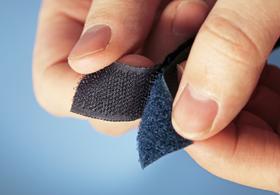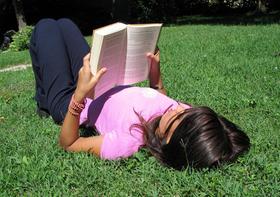The other day I heard about a father bemoaning the fact that his nineteen-year-old son was a mess. The gist of this father's complaint was that he had done so much for his child but nothing seemed to be appreciated. I totally understand the complexities and pitfalls of raising children in the 21st century. It is a scary, very different world from the one I was raised in back in the 50s and 60s, for sure. It is a much different world from where we raised our four children. And, yes, there were times - not many - when I was guilty of being a velcro or helicopter parent. I couldn't bear to see my children fail or make the mistakes I made. Unfortunately, that strategy never produced the results I was expecting.
With all this in mind, let's examine what happens when parents over-indulge and over-protect their children.
What do the terms "velcro" and "helicopter" parents mean?
The term "velcro parent" describes the kind of parent who sticks close to his child to protect him. The "helicopter parent" is constantly hovering around her child to protect him. Merriam-Webster's Dictionary defines a helicopter parent as "a parent who is overly involved in the life of his or her child". While there is no "velcro parent" entry, one can only assume that it will not be long before there is.
Velcro and helicopter parents have their children's best interests at heart. At least, that's how I remember rationalizing my helicoptering. The problem with this parenting strategy is that our children don't learn how to face life's challenges and everyday situations with confidence.
Velcro and helicopter parents do not want to let their children go. They cannot stand the thought of them failing or getting hurt. Yet when it comes to educating your child, isn't that really what it is all about? You have to let go, otherwise, your child will not become independent. You will also teach him that whenever anything goes wrong, Mommy will fix it. They will fail. They will get hurt. Teaching them how to cope with life's hurts and failures is what good parenting is all about.
It's a fine line we tread between being too involved and not involved enough. Teaching your child to ask for help and that you are always approachable is one of the fundamentals of parenting. Your child develops good judgment and self-confidence when you lose the reins. Let me give you an example that completely amazed me when it happened. I had interviewed a young man - he was probably 23 or 24 years old - for a job. I was initially impressed with the applicant and recommended him for a second interview with one of my colleagues. As luck would have it, my colleague uncovered some material information that prevented our making a job offer. I got a call the next from the applicant's mother demanding to know why her son had not been offered a job. The applicant never called me. His mother did. What she thought she could accomplish was beyond me.
It begins in childhood.
It starts with the earliest years. My friend's nineteen-year-old didn't suddenly become a monster in his teens. My friend had sown the seeds for that teenage behavior years ago when his son was an infant. My friend had done what he had thought were the right things to do. Mr friend came from a poor family. So he made sure that his son had every toy, every game, all the clothes, and all the trips he never had as a boy. My friend also had willing, loving accomplices in his aunts, uncles, and grandparents, adding another deep layer of indulgence. Now, what chance did the kid have? He grew up expecting things just to be handed to him.
Parents need to learn how to be guides.
It is one of the toughest things to do. You cannot be in the driver's seat. Not even in the car. You must give your child a road map and suggest some routes to his destination. This is where the link with your child's education comes in. As your child progresses through elementary and middle school, you will see likes and dislikes develop. She will excel in certain subjects and perhaps be average in others. Forget about what other children at her age are doing. Encourage her likes. Show her how to cope with things and people which she dislikes. But resist the temptation to jump in and deal with those situations yourself unless the situations are threatening or abusive or worse. Be the guide. Show her the way. Allow her to make her own way down that path.
Parents need to learn how to be reference points.
As our children grow up, we need to be guides, as I described previously. But we also have to learn how to be reference points for our children. The idea is not to shield or hover but rather be a helpful, non-judgmental adult with ideas and experience always available to his children. Many times you will have to resist the temptation of being judgmental. "Have you explored these possibilities?" is better than "Why in the world would you want to do that?" for example.
My daughters grew up with a mother who had cultivated strong relationships with her girls. She knew them inside out and backward. But she was no velcro parent. Protective? Yes, but in the right ways. Issues and problems were discussed rationally and analytically. They may not have always agreed but they knew where they stood with each other. The result was each girl thought of their mother as their best friend. She was always there for them when they needed her. She was a true guide and reference point for them.
Parents support their children with sound decisions.
Preparing your children for life means being proactive in certain basic areas, such as education. Choose the right school for your child. Get involved with the school. Be an active supporter of its programs and activities. But does not do her homework or prepare her projects. Should you help her as needed? Absolutely. Should you suggest courses, she ought to take? Yes, provided they fit into her plans and not simply your idea of what she should be in her adult life. For example, if you have decided that she should be a doctor but she wants to be a teacher, you need to back off. That's her decision. You need to support her and guide her.
Things get even more complicated when your child selects a life partner. Despite everything you believe and hold dear, you could be faced with a situation you do not like or agree with. Check your impulses and criticisms. She's your child. You did a good job raising her and instilling the values which matter to you. Relax. They will be just fine.
Parent by example.
If education matters to you, you will have done well in school and college. You studied hard. You made the dean's list. Your child will see that example and be guided by it. You are rarely late for work. You took on extra assignments cheerfully. Your child will see that example and be guided by it. When moral issues arise, you have always weighed in with your opinion. But most importantly, your actions reflect that opinion. Your child will see that example and be guided by it.
"Do as I say" is a much less effective parenting technique than "Do as I do." That is really what is behind the velcro and helicopter parents' fears and anxiety. They worry too much about what might happen.
Questions? Contact us on Facebook. @privateschool





















